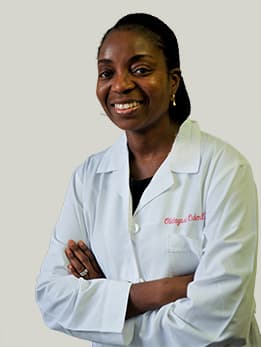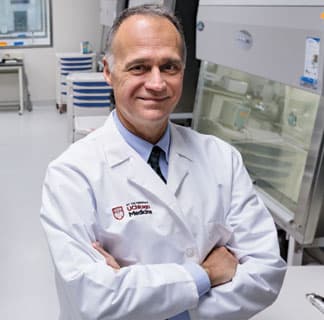Stem cell transplant becomes a treatment option for older adults with blood cancers

These days, age is just a number, as many thriving, active seniors can verify. However, in the face of a serious illness, like cancer, age can be a limiting factor. But with the right treatment strategy, some adults 60 and over are resilient enough to fare as well as their younger counterparts. This concept underlies a unique program at the University of Chicago Medicine that evaluates older patients with blood cancers and helps them receive treatments and supportive care best suited to their needs.
Finding a different path forward
Charlotte Garest of Plainfield, Illinois, was in her 70s when she was diagnosed with a severe blood cancer, acute myeloid leukemia (AML). The odds of surviving AML are very low for individuals over 60—only in the 10% range. The disease is difficult to treat and often relapses, especially for patients with a mutation in the FLT-3 gene, which Charlotte had.
The standard treatment is intensive chemotherapy, which elderly or frail patients are less able to withstand. This leaves patients like Charlotte with few effective treatment options. Historically, treatment for these patients has focused on improving their quality of life by managing symptoms and providing emotional support.
But that’s no longer the case as safer and more effective AML treatments are being tested in therapeutic clinical trials. Some of these new treatments could help people in Charlotte's situation.
She was referred to UChicago Medicine for treatment of her AML. She met with medical oncologist Olatoyosi Odenike, MD, director of the leukemia program, who recommended she participate in a clinical trial and explained the details so that she and her family could make an informed decision. As a cancer center designated by the National Cancer Institute, UChicago Medicine Comprehensive Cancer Center offers a robust portfolio of clinical trials that gives patients access to the latest treatments in development.
“Our approach is to offer every patient who comes through the doors a novel way of doing things,” Odenike said. “A clinical trial gives them an opportunity for a new approach that will improve upon the standard.”
Charlotte enrolled in the study (a Phase 1 clinical trial), and for about 10 months, she took venetoclax, a new oral drug that stops a protein called BCL-2; stopping BCL2 induces cancer cells to die, and injections of decitabine, a chemotherapy that helps bone marrow produce normal blood cells. The study was testing the optimal dose of venetoclax that could be combined with a standard dose of decitabine.
After a few rounds of treatment, Charlotte's AML went into remission and she grew stronger and healthier. She felt well enough to consider other options – including a stem cell transplant. In this procedure, stem cells from a matching donor are collected and transplanted into a patient with blood cancer to replenish the patient’s blood cells, thereby restoring their immune system.
Although this therapeutic approach offers the best possible long-term disease control, it can be more difficult or dangerous for older adults because of a higher risk for complications, such as toxicity and mortality.
Pre-transplant assessment leads to better post-transplant outcomes
Before the transplant, Charlotte met with a team in UChicago Medicine’s Transplant Optimization Program (TOP). The program aims to improve the success rate of transplants in older patients. This approach involves gathering a multidisciplinary group of providers who perform comprehensive, cancer-specific geriatric assessments to gauge the safety of transplant for each patient.
The TOP team comprises hematologist-oncologists on the stem cell transplant team, geriatric oncology experts, an infectious disease physician, dietitian, social worker and a physical and/or occupational therapist. Together, this group of specialists identifies issues that could interfere with the outcome of a stem cell transplant and designs an individualized care plan for each patient.
Their assessment is based on criteria the group established to evaluate and enhance older patients’ resilience and functional capacity for safely pursuing transplant. They use this geriatric assessment tool to determine a patient’s physiologic age based on the following:
- functional status (ability to perform normal daily activities)
- comorbidities (the presence of other medical conditions)
- cognitive abilities
- behavioral conditions
- social and economic support
- nutritional status
- polypharmacy (being on multiple prescription drugs)
The team of experts also suggests ways to address or prevent health issues and make patient-specific recommendations for evaluation and supportive care to optimize outcomes after therapy. Some examples include monitoring other existing health issues post-transplant, prescribing devices to minimize fall risk or conducting pre-transplant family meetings to widen a person’s social support network.
An emerging trend and promising outcomes
The incidence of almost all blood cancers increases with age and peaks in patients older than 65. Emerging data supports that select patients aged 70 or older should be considered for transplantation.
A research team led by oncologist Andrew Artz, MD, then at UChicago Medicine (now at City of Hope), analyzed the incidence and outcomes of stem cell transplantation performed in patients age 70 or older. The team reported a two-year post-transplant survival rate of 40% for patients in their 70s and 80s, providing evidence for the safety and feasibility of stem cell transplantations for older adults.1
Artz and UChicago Medicine colleagues published another study2 describing their efforts to optimize outcomes after stem cell transplants in older patients with blood cancers. They showed that the benefits of being evaluated in this multidisciplinary team clinic were shorter inpatient stays, fewer nursing home admissions and better early survival rates.
“Our study shifted the approach of performing geriatric assessment from determining ‘yes’ or ‘no’ to transplant to one of creating avenues for optimization and, ultimately, better outcomes,” said oncologist Benjamin A. Derman, MD. “A geriatric assessment remains an essential component to both uncover vulnerabilities and identify patient strengths.”
After meeting with Charlotte, the TOP team determined that she was likely to do well because of her active lifestyle and supportive friends and family.
She underwent a stem cell transplant at UChicago Medicine in March 2017 using stem cells from her sister. She recovered in the hospital for two weeks. After a few challenges, including a skin rash caused by graft-versus-host disease and low blood counts that required several blood transfusions, Charlotte regained strength and was able to return to a lifestyle that was almost as active as before. Today, she still comes to UChicago Medicine for regular checkups.
“Mrs. Garest is a prime example for how older adults with AML can aim for a curative approach, with a potentially gentler treatment plan to get the disease into remission and then proceed with a transplant,” said Odenike.
As Charlotte herself put it, “I am convinced that I am the luckiest person in the world to not only have survived cancer, but to also be well enough to enjoy my life with my truly amazing family and friends."
References
1 Olatoyosi Odenike, MD, is an expert in the care of adults with leukemia, chronic myeloproliferative disorders and myelodysplastic syndromes. Dr. Odenike leads several clinical trials of new ways to treat these conditions. Cellular therapy — the transfer of human cells to heal or replace damaged tissue or cells — holds much promise for patients with cancer and other diseases. UChicago Medicine physicians are pioneers in cellular therapy care, including CAR T-cell therapy, stem cell transplantation and TIL therapy.
Olatoyosi Odenike, MD

Leaders in Cellular Therapy Care & Research
